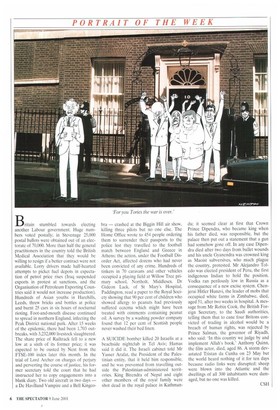PORTRAIT OF THE WEEK
Tor you Tories the war is over.' Britain stumbled towards electing another Labour government. Huge numbers voted postally; in Stevenage 25.000 postal ballots were obtained out of an electorate of 70,000. More than half the general practitioners in the country told the British Medical Association that they would be willing to resign if a better contract were not available. Lorry drivers made half-hearted attempts to picket fuel depots in expectation of petrol price rises (Iraq suspended exports in protest at sanctions, and the Organisation of Petroleum Exporting Countries said it would not increase production). Hundreds of Asian youths in Harehills, Leeds, threw bricks and bottles at police and burnt 25 cars in six hours of nocturnal rioting. Foot-and-mouth disease continued to spread in northern England, infecting the Peak District national park. After 15 weeks of the epidemic, there had been 1,703 outbreaks, with 3,232,000 livestock slaughtered. The share price of Railtrack fell to a new low at a sixth of its former price; it was expected to be ousted by Next from the FTSE-100 index later this month. In the trial of Lord Archer on charges of perjury and perverting the course of justice, his former secretary told the court that he had instructed her to copy engagements into a blank diary. Two old aircraft in two days — a De Havilland Vampire and a Bell Kingco
bra — crashed at the Biggin Hill air show, killing three pilots but no one else. The Home Office wrote to 454 people ordering them to surrender their passports to the police lest they travelled to the football match between England and Greece in Athens; the action, under the Football Disorder Act, affected dozens who had never been convicted of any crime. Hundreds of tinkers in 70 caravans and other vehicles occupied a playing field at Willow Tree primary school, Northolt, Middlesex. Dr Gideon Lack, of St Mary's Hospital, Paddington, read a paper to the Royal Society showing that 90 per cent of children who showed allergy to peanuts had previously suffered eczema which might have been treated with ointments containing peanut oil. A survey by a washing powder company found that 12 per cent of Scottish people never washed their bed linen.
A SUICIDE bomber killed 20 Israelis at a beachside nightclub in Tel Aviv; Hamas said it did it. The Israeli cabinet told Mr Yasser Arafat, the President of the Palestinian entity, that it held him responsible, and he was prevented from travelling outside the Palestinian-administered territories. King Birendra of Nepal and eight other members of the royal family were shot dead in the royal palace in Kathman
du; it seemed clear at first that Crown Prince Dipendra, who became king when his father died, was responsible, but the palace then put out a statement that a gun had somehow gone off. In any case Dipendra died after two days from bullet wounds and his uncle Gyanendra was crowned king as Maoist subversives, who much plague the country, protested. Mr Alejandro Toledo was elected president of Peru, the first indigenous Indian to hold the position. Vodka ran perilously low in Russia as a consequence of a new excise system. Chenjerai Hitler Hunzvi, the leader of mobs that occupied white farms in Zimbabwe, died, aged 51, after two weeks in hospital. A message from Mr Robin Cook, the British Foreign Secretary, to the Saudi authorities, telling them that to cane four Britons convicted of trading in alcohol would be a breach of human rights, was rejected by Prince Salman, the governor of Riyadh, who said: In this country we judge by and implement Allah's book.' Anthony Quinn, the film actor, died, aged 86. A storm devastated Tristan da Cunha on 23 May but the world heard nothing of it for ten days because radio links were disrupted; sheep were blown into the Atlantic and the dwellings of all 300 inhabitants were damaged, but no one was killed.
CSH


































































 Previous page
Previous page